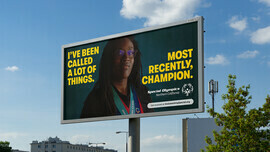 34
34

In the United States, nearly 1 in 3 students ages 12 to 18 report being bullied and 71% say they have seen bullying in their schools. Children with disabilities are two to three times more likely to be bullied than their peers without disabilities.
It would be understandable to portray these children as victims. But with our Special Olympics campaign, we decided to go the other way.
We didn’t create sympathy for people with intellectual disabilities, we created admiration. Special Olympians are amazing individuals. They’re strong, they’re determined, and they’re more than capable of expressing themselves.
They are “special”, but in a way that deserves to be celebrated not marginalized.
Everyone knows the Special Olympics. But not everyone recognizes the impact it has on thousands of athletes. It’s not even in Forbes’ top 75 charitable organizations to support.
For Special Olympics Northern California (SONC), donations and volunteer activity were at a standstill. No one beyond athletes’ families were providing support. We needed to start a community-wide movement that not only shifted perceptions but drove advocacy.
Our research found that people weaponize the word “special.” It was increasingly perceived in a derogatory way to mean “different” or “less than.”
It begged the question: why should “special” carry negative connotations when every day, these athletes are doing things that are so… special?
Our big idea became a rally cry: “Special isn’t what we are, it’s what we do.”
We challenged the word’s negative associations, and made “special” our own again.
The result was a highly integrated campaign across OOH, TV/ video, cinema, radio, social, and a DoSomethingSpecial.Org landing page. We even created a groundbreaking YouTube interview series called “The Special Report”, hosted by the athletes themselves.
The media community responded and we received 700% beyond what we invested, driving over 83MM impressions.
Research revealed that we changed perceptions dramatically.
When NorCal residents were asked what comes to mind when people with intellectual disabilities are described as “Special,” the campaign dramatically reduced negative connotations and increased the positive. “Inspirational” and “Powerful” experienced the largest gains, while “Less than” experienced the most significant drop.
Best of all? Volunteers rose 50% and donation consideration rose 127%.
N/A
N/A